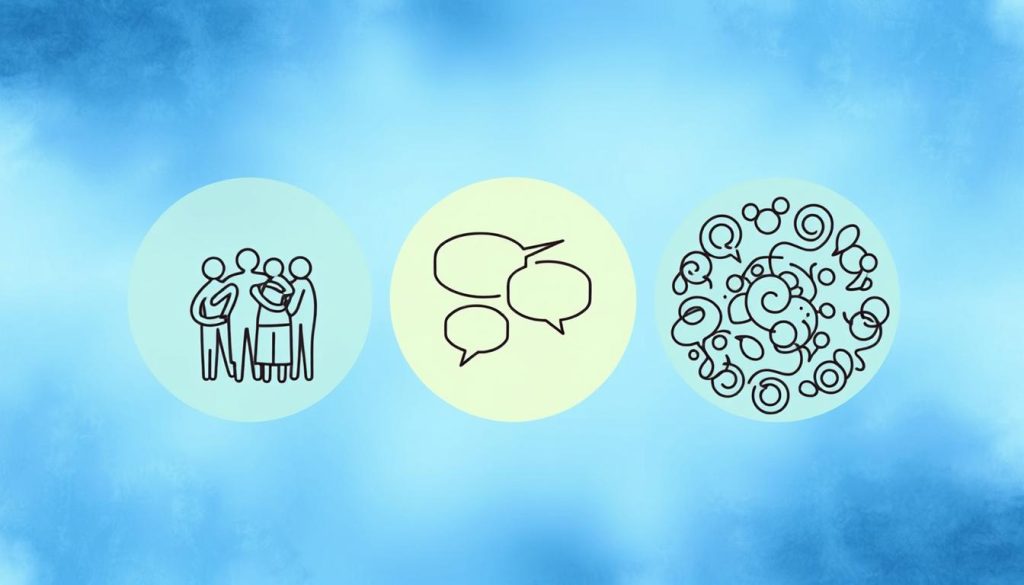Spotting autism spectrum disorder symptoms can be hard. This guide will cover the three main signs experts look for when diagnosing autism. We’ll see how these symptoms appear in both kids and adults.
It’s vital for families and caregivers to know the early signs of autism. By learning about these key symptoms, you can spot red flags early. This way, you can get help if needed. Let’s explore the main features of autism spectrum disorder together.
Understanding Autism Spectrum Disorder: A Comprehensive Overview
Autism Spectrum Disorder (ASD) is a complex condition that affects millions globally. This overview covers the key aspects of ASD, including its definition, spectrum nature, and current prevalence.
Defining Autism in Modern Medicine
In modern medicine, autism spectrum disorder is defined by challenges in social communication and interaction. It also includes restricted and repetitive behavior patterns. These symptoms usually appear in early childhood and affect daily life.
The Spectrum Nature of Autism
ASD is seen as a spectrum, showing the range of strengths and challenges people may face. This spectrum approach highlights that each person with autism is unique. Their abilities and difficulties vary in severity and presentation.
Current Prevalence and Statistics
Recent studies have shown a significant rise in ASD diagnoses. The Centers for Disease Control and Prevention (CDC) reports the following statistics:
| Year | Prevalence Rate | Age Group |
|---|---|---|
| 2020 | 1 in 54 | 8-year-olds |
| 2022 | 1 in 44 | 8-year-olds |
| 2023 | 1 in 36 | 8-year-olds |
These statistics highlight the need to understand autism diagnostic criteria and early intervention. As awareness grows, so does the need for support systems for individuals with ASD and their families.
What Are The 3 Main Symptoms of Autism
It’s key to know the main signs of autism for early help. Parents and caregivers often wonder, “What are the 3 main symptoms of autism?” These signs help spot autism in children’s growth.

- Social communication and interaction challenges
- Restricted and repetitive behavioral patterns
- Language and communication deficits
These symptoms show up in different ways in each person. This shows how autism affects everyone differently. Let’s look at these main signs more closely:
| Symptom | Description | Example |
|---|---|---|
| Social challenges | Difficulty in social interactions and understanding social cues | Avoiding eye contact, not responding to name |
| Repetitive behaviors | Engaging in repetitive actions or having rigid interests | Hand flapping, lining up toys |
| Communication deficits | Delays in language development or unusual language patterns | Delayed speech, echolalia |
Spotting these autism signs early can help get the right support. It’s vital to remember that how these symptoms show can vary a lot among people with autism.
Social Communication and Interaction Challenges
People with autism often face social challenges that affect their daily lives. These issues can make it hard to connect with others and navigate social situations. Let’s explore the key areas where individuals with autism may struggle.
Difficulty with Social Reciprocity
Many individuals with autism find it tough to engage in back-and-forth conversations. They might not pick up on social cues or understand unwritten rules of interaction. This can lead to one-sided talks or awkward silences. Some may also struggle to share interests or emotions with others.
Nonverbal Communication Issues
Nonverbal autism signs are common and can include challenges with body language, facial expressions, and eye contact. A person with autism might not use or interpret these nonverbal cues correctly. This can make it hard for them to express themselves or understand others’ emotions.
Challenges in Developing Relationships
Building and maintaining friendships can be tricky for those with autism. They might have trouble adjusting their behavior to fit different social contexts. Some may prefer to be alone or struggle to understand the concept of sharing experiences. These social impairments in autism can impact relationships at school, work, and in personal life.
Understanding these challenges is key for creating supportive environments. With the right help, individuals with autism can improve their social skills and form meaningful connections.
Restricted and Repetitive Behavioral Patterns
Repetitive behaviors are a big part of autism spectrum disorder symptoms. Kids with autism often get really into certain topics or objects. They might spend hours lining up toys or talking about one subject. These behaviors can be simple or very complex.

- Hand flapping or rocking
- Repeating words or phrases
- Spinning objects
- Organizing items in specific patterns
- Insistence on following routines
These actions help them cope or self-soothe. For some, they offer a sense of control in a chaotic world. It’s key for parents and caregivers to understand these behaviors to support those with autism well.
| Behavior Type | Example | Possible Function |
|---|---|---|
| Motor | Hand flapping | Self-stimulation |
| Verbal | Echolalia | Communication attempt |
| Routine-based | Strict meal times | Anxiety reduction |
| Object-focused | Lining up toys | Creating order |
While these behaviors can be tough, they also show unique strengths and interests. By understanding and working with these patterns, we can support individuals on the autism spectrum better in their daily lives.
Language and Communication Deficits
Language and communication challenges are big parts of autism spectrum disorder. These issues can be mild or very severe. It’s important to understand them early to help.
Delayed Speech Development
Many kids with autism talk later than others. This is one of the first signs parents might see. Some might not talk at all, while others start later. Early help can really boost their language skills.
Echolalia and Language Patterns
Echolalia is a special way of speaking seen in autism. It’s when someone repeats words or phrases they’ve heard. It might sound strange, but it can help them learn to communicate better.
Comprehension Difficulties
People with autism might find it hard to understand what’s said to them. They might struggle with tricky words, jokes, or sarcasm. This can cause problems in social situations and when following instructions.
| Communication Aspect | Common Challenges | Possible Strategies |
|---|---|---|
| Speech Development | Delayed or absent speech | Speech therapy, sign language |
| Language Patterns | Echolalia, scripted speech | Modeling appropriate responses |
| Comprehension | Difficulty with abstract language | Visual aids, clear and concise instructions |
Knowing about these communication challenges can help parents and caregivers get the right support. Early help and special strategies can really help improve how people with autism talk and understand.
Early Warning Signs in Infants and Toddlers

It’s important to spot early signs of autism in young children. Parents and caregivers need to know the autism red flags that can show up early. These signs don’t mean a child definitely has autism, but they do suggest a need for a check-up.
Infants might not make eye contact, show few facial expressions, or ignore their name. Toddlers could repeat actions, find it hard to adjust to new things, or talk later than their peers. Seeing these signs doesn’t mean a child has autism for sure. But, it’s a good reason to talk to a doctor.
| Age Group | Potential Early Signs of Autism |
|---|---|
| Infants (0-12 months) | Limited eye contact, lack of social smiling, reduced babbling |
| Toddlers (1-3 years) | Delayed speech, repetitive behaviors, difficulty with changes in routine |
Parents should keep an eye on their child’s growth and talk to doctors if they’re worried. Finding autism early can help a lot. Every child grows differently, and only a doctor can say for sure if it’s autism or something else.
The Role of Developmental Milestones in Diagnosis
Developmental milestones are key in spotting autism developmental delays. They help doctors and parents see if a child is on track. Knowing these milestones is important for catching autism early.
Age-Specific Markers
Every age has its own milestones. For instance, by 12 months, babies should know their name and wave. By 24 months, they should say two-word phrases and enjoy playing with others. Missing these signs might mean a child needs more checks.
Monitoring Development Progress
Regular visits to the pediatrician are vital for tracking a child’s growth. Doctors use special tools to check various skills and behaviors. Parents can also watch their child’s daily life and talk to doctors if they notice anything different.
When diagnosing autism, doctors look at a child’s past development. They compare it to typical milestones. This way, families and doctors can spot autism early and help the child.
Sensory Processing Differences in Autism
People with autism face unique challenges in how they process sensory information. These differences are a big part of autism spectrum disorder symptoms. They affect how they see and react to the world.

Autism can make some people very sensitive or not sensitive enough to different things. For example, some might find everyday sounds or lights too much. Others might seek out very intense sensory experiences.
Some common sensory differences include:
- Sensitivity to sounds
- Unusual reactions to lights or colors
- Aversion to certain textures or tastes
- Difficulty processing multiple sensory inputs at once
These challenges can really affect daily life. They might make someone avoid eye contact or struggle to talk. This is because of how they process visual and auditory information.
It’s important to understand these differences. This helps create supportive environments. It also helps develop strategies for daily life.
Learning about these differences is key. It helps us support people with autism better. It makes their daily lives more comfortable.
For more information, check out this article on ADHD and mental health.
Diagnostic Process and Professional Assessment
Finding out if a child has autism spectrum disorder is a detailed process. Doctors look for certain signs in kids. They follow several steps to make sure they get it right.
Medical Evaluation Steps
Doctors start by checking the child’s health. They look at the child’s past and do physical tests. They search for any genetic or brain problems that might cause the symptoms.
Behavioral Observations
Experts watch how the child acts in different places. They look for autism red flags like not making eye contact or doing the same thing over and over. These observations help understand the child’s challenges better.
Standardized Testing Methods
Standard tests are key in figuring out if a child has autism. They check how well the child talks, thinks, and acts. Some tests used are:
- Autism Diagnostic Observation Schedule (ADOS)
- Autism Diagnostic Interview-Revised (ADI-R)
- Childhood Autism Rating Scale (CARS)
| Assessment Area | Tools Used | What It Measures |
|---|---|---|
| Social Communication | ADOS, ADI-R | Interaction skills, nonverbal communication |
| Repetitive Behaviors | CARS, ADI-R | Restricted interests, stereotyped movements |
| Cognitive Function | IQ tests, developmental scales | Intelligence, problem-solving abilities |
These tools help give a full picture. The aim is to spot autism early and start the right help. Only experts can say for sure if a child has autism.
Impact of Early Intervention and Treatment
Spotting the early signs of autism is key for early action. Studies prove that starting treatment early can greatly help kids with autism. Early intervention programs help kids learn important skills and lessen autism symptoms.

- Speech and language therapy
- Occupational therapy
- Behavioral interventions
- Social skills training
These treatments focus on autism’s main challenges, like talking and acting in patterns. Starting treatment early uses the brain’s ability to change, leading to better results later on.
| Age of Intervention | Potential Benefits |
|---|---|
| Before age 3 | Improved language skills, social interaction, and cognitive abilities |
| Ages 3-5 | Enhanced school readiness and reduced need for special education services |
| After age 5 | Continued progress, but potentially slower gains compared to earlier intervention |
If you think your child might have autism, get help right away. Early diagnosis and treatment can greatly improve a child’s life. It can lead to better social skills, communication, and overall happiness.
Supporting Children with Autism at Home and School
Creating supportive environments for children with autism is key. It’s about understanding their unique needs and making spaces work for them. Both home and school are important for a child’s growth.
Creating Supportive Environments
At home, set up routines and use visual schedules to guide daily activities. Make quiet spaces and use soft lighting to reduce sensory overload. At school, work with teachers to apply similar strategies. Consider noise-canceling headphones or fidget toys for better focus.
Educational Accommodations
Schools can make many changes to support students with autism. These include:
- Providing visual aids for instructions
- Allowing extra time for assignments
- Offering one-on-one support
- Using social stories to explain situations
- Creating a calm-down corner in the classroom
It’s important for parents and teachers to communicate well. Regular meetings help track progress and adjust strategies as needed.
| Home Accommodations | School Accommodations |
|---|---|
| Structured daily routines | Visual class schedules |
| Sensory-friendly spaces | Quiet work areas |
| Visual communication tools | Assistive technology |
| Predictable meal times | Flexible seating options |
Resources and Support Networks for Families
Families facing autism spectrum disorder symptoms know they’re not alone. Many organizations offer support, education, and resources. The Autism Society of America has local chapters across the U.S. They connect families with nearby support groups and services.
Online communities are key for sharing experiences and advice. Autism Speaks has a lot of information, including toolkits that explain autism diagnostic criteria. These resources help families understand diagnosis and treatment options.
The National Association of Special Education Teachers provides educational support. They offer strategies for inclusive learning environments for children with autism. Local libraries also have books and DVDs about autism, which are free resources for families.
Your child’s healthcare provider can recommend local support groups. These groups are safe spaces for families to share their journeys. They exchange tips and build connections with others who understand their experiences.
FAQ
Q: What are the 3 main symptoms of autism?
A: Autism’s main symptoms are: 1) Challenges in social communication and interaction, 2) Repetitive behaviors, and 3) Language and communication issues. These symptoms vary in each person with autism.
Q: At what age can autism be diagnosed?
A: Autism can be diagnosed as early as 18 to 24 months. But, some kids might not show signs until later. Early diagnosis is key for support and help.
Q: What are some early signs of autism in toddlers?
A: Early signs in toddlers include: little eye contact, not responding to their name, and delayed speech. They might also show repetitive behaviors, not want to play with others, and react strangely to sounds or sights. Remember, not all kids with autism will show all these signs.
Q: How is autism diagnosed?
A: Diagnosing autism involves a detailed evaluation. This includes looking at medical history, observing behavior, and using tests. A team of experts, like psychologists and speech therapists, does the assessment.
Q: Can autism be cured?
A: There’s no cure for autism, but treatments can greatly improve life. These treatments help with communication and social skills. Early help is very important for development.
Q: What are some common repetitive behaviors in autism?
A: Common behaviors include hand-flapping, rocking, and spinning. Kids might also line up toys, stick to routines, and focus intensely on certain things. These behaviors differ in each person with autism.
Q: How does autism affect communication?
A: Autism can make communication hard. It might cause delayed speech, trouble with nonverbal cues, and literal language use. Some might struggle with conversations or use nonverbal autism. The impact varies from mild to severe.
Q: What are some effective interventions for autism?
A: Good interventions include Applied Behavior Analysis (ABA), speech therapy, and occupational therapy. Social skills training and educational support also help. The best approach depends on the individual’s needs.
Q: Are there any medications for autism?
A: There are no autism-specific medications. But, some can help with symptoms like anxiety or attention issues. Always get medication from a doctor.
Q: How can I support a family member with autism?
A: Supporting someone with autism means understanding their needs and creating a supportive space. Advocate for their education and therapy. Staying informed and joining support groups can also help.


















